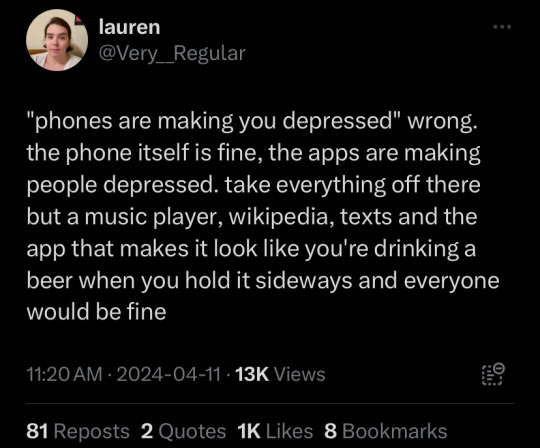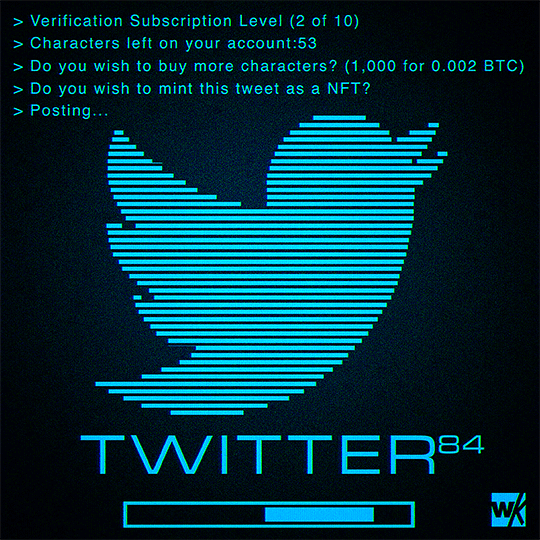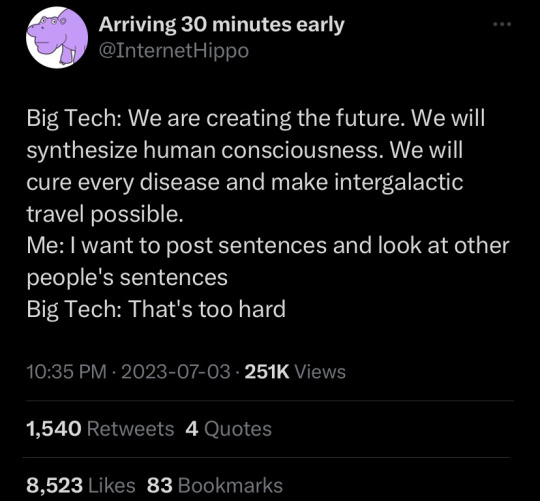#social technologies
Explore tagged Tumblr posts
Text

8K notes
·
View notes
Text
And once again, conservatives telling on themselves when they reveal that without external imperatives to be good to the people around them, they would “act like a psychopath towards your neighbors.”
As Sir Terry Pratchett said (in the text it was the cause of his knighting), put into the mouth of a character who is explicitly supposed to be morally correct on as close to an objective level as possible, “personal isn’t the same as important.”
Of course, we are responsible to be decent to the people around us, but not acting decently or morally to those outside your daily interactions is a childlike sense of object impermanence. It is much easier to be reasonable and decent to those around you, because you only have to regulate your direct actions, while it takes more care to realize that you were affecting people who you don’t necessarily see or talk to, and should also be aware of how your life will affect theirs and act morally accordingly.
I would very directly say that assigning weight merely on proximity is in fact antithetical to the general concept of modern civilization, and indeed the organizing of large-scale human civilizations in general. It is only by using social technologies to advance beyond tribalism and surpass the limits of Dunbar's number that we manage to create the modern interconnected world that we live in.
And lest conservatives take issue with the very concept of bypassing Dunbar's number to care about people beyond your metaphorical line of sight, I would say that monarchy and Christianity are in fact an excellent examples of this social technology, using a single individual as an object of metonomy take care about all followers of a religion, or all members of estate by caring about the individual dictating its rules.
The reason I can tell that on some bone-deep and fundamental level I am temperamentally a liberal is that, like -
Even if all the wonky neo-trad arguments about the declining marriage rate and the collapse in church attendance/thick inherited community obligations and etc etc were entirely correct on the object level and (to the first approximation) everyone really would be happier and more fulfilled if we ended no-fault divorce and brought back shotgun weddings and arranged marriages -
My incredibly powerful visceral reaction is no, not worth it. The dissolution of all unchosen bonds is a terminal value to be pursued for its own sake. You are a citizen of a the world and a cousin to every living soul, all else is (should be) as fleeting and contingent as your passions and whims. Concessions to reality on this are purely temporary and pragmatic.
#social science#social technologies#social technology#Dunbar's number#moral weight#personal isn’t the same as important#captain carrot#discworld#gnu sir terry pratchett#terry pratchett
413 notes
·
View notes
Text

AI under capitalism
#late stage capitalism#leftblr#working class#left wing#tech news#tech#technology#ai#class war#leftist#socialism
714 notes
·
View notes
Text
Low Tech Solarpunk
The level of tech in my personal version of Solarpunk is a lot more like tech in to 90's and early two thousands
Physical media libraries (books, video games, movies)
Phone booths
Small phones (of sustainable materials) with long battery life and with basic internet (for navigation and safety necessities etc), no apps or camera
The internet itself being more like the old internet so no algorithms, and there would be no ads other than for free events
You won't see the amount of likes, followers or views on other peoples content or profile, only on your own
Social media profiles' appearance would be a lot more customisable and fun again
Those are just some things that imo we got right the first time and honestly wouldn't mind bringing back
#hopecore#hopepunk#solarpunk#peaceful revolution#greenhorizon#anti capitalism#climate change solutions#naturecore#forestcore#lunarpunk#tech#low tech#technology#smart phones#social media#algorithm#internet#old internet#2000s web#webcore#old web#90's#90's nostalgia#retrogaming#nintendo
613 notes
·
View notes
Text
I keep hearing people say “The internet isn’t forever my favorite shows are being taken down and there’s so much lost content from old websites”
Guys, that’s not the meaning of the phrase. It’s about internet safety.
“The internet is forever” means that if you post something, it can be copied, reposted, saved to someone else’s computer. You are no longer in control of where it goes. It does not mean the internet is an infallible archive.
Be responsible with your stuff, post only what you are ok with being out there forever and protect what you mean to keep forever.
3K notes
·
View notes
Text



#free palestine#palestine#israel#AI#lapd#democrats#republicans#politics#books#technology#military#social media#Science#blm
458 notes
·
View notes
Text
A thought I’ve been having: While it's important to recognize the long history of many current queer identities (and the even longer history of people who lived outside of the straight, cis, allo “norm”) I think it's also important to remember that a label or identity doesn't have to be old to be, for lack of a better word, real.
This post that i reblogged a little while ago about asexuality and its history in the LGBTQ+ rights movement and before is really good and really important. As i've thought about it more, though, it makes me wonder why we need to prove that our labels have "always existed." In the case of asexuality, that post is pushing back against exclusionists who say that asexuality was “made up on the internet” and is therefore invalid. The post proves that untrue, which is important, because it takes away a tool for exclusionists.
But aromanticism, a label & community with a lot of overlap & solidarity with asexuality, was not a label that existed during Stonewall and the subsequent movement. It was coined a couple decades ago, on internet forums. While the phrasing is dismissive, it would be technically accurate to say that it was “made up on the internet.” To be very clear, I’m not agreeing with the exclusionists here—I’m aromantic myself. What I’m asking is, why does being a relatively recently coined label make it any less real or valid for people to identify with?
I think this emphasis on historical precedent is what leads to some of the attempts to label historical figures with modern terminology. If we can say someone who lived 100 or 1000 years ago was gay, or nonbinary, or asexual, or whatever, then that grants the identity legitimacy. but that's not the terminology they would have used then, and we have no way of knowing how, or if, any historical person's experiences would fit into modern terminology.
There's an element of "the map is not the territory" here, you know? Like this really good post says, labels are social technologies. There's a tendency in the modern Western queer community to act like in the last few decades the "truth" about how genders and orientations work has become more widespread and accepted. But that leaves out all the cultures, both historical and modern, that use a model of gender and sexuality that doesn't map neatly to LGBTQ+ identities but is nonetheless far more nuanced than "there are two genders, man and woman, and everyone is allo and straight." Those systems aren’t any more or less “true” than the system of gay/bi/pan/etc and straight, cis and trans, aro/ace and allo.
I guess what I’m saying is, and please bear with me here, “gay” people have not always existed. “Nonbinary” people have not always existed. “Asexual” people have not always existed. But people who fell in love with and had sex with others of the same gender have always existed. People who would not have identified themselves as either men or women have always existed. People who didn’t prioritize sex (and/or romance) as important parts of their lives have always existed. In the grand scheme of human existence, all our labels are new, and that’s okay. In another hundred or thousand years we’ll have completely different ways of thinking about gender and sexuality, and that’ll be okay too. Our labels can still be meaningful to us and our experiences right now, and that makes them real and important no matter how new they are.
We have a history, and we should not let it be erased. But we don’t need a history for our experiences and ways of describing ourselves to be real, right now.
#stars has thoughts#i'm not letting the exclusionists have this one#'it was coined on the internet' 'it was only coined a few (read: in the case of aromanticism almost 20) years ago' true. so what?#that doesn't make it less real#i hope what i'm getting at comes across here#(and that it doesn't sound like im trying to invalidate all LGBTQ+ labels lol. i'm trying so hard to not do that)#labels are social technologies. if they are useful here and now then they are useful#we are using technologies that are new and innovative and useful to us in this time and place#in other times and places they have not always been and will not always be useful#but that's true of any technology. doesn't mean we don't get to use them now#queer#aspec stuff#aro thoughts
421 notes
·
View notes
Text

"The timing of the tool’s shutdown, months ahead of a major US presidential election, has drawn concern from groups that relied on CrowdTangle to track the flow of information on social media, including viral falsehoods that have led to real-world harm.
Using CrowdTangle, journalists and researchers could show how many users engaged with a piece of content, which groups supercharged the spread of a post and just how often political and medical misinformation went viral on Facebook and Instagram."
source 1
source 2
source 3
#destiel meme news#destiel meme#news#united states#us news#world news#facebook#instagram#meta#mark zuckerberg#misinformation#disinformation#crowdtangle#technology#tech industry#social media
712 notes
·
View notes
Text

237 notes
·
View notes
Text

Twitter84
#twitter#cyberpunk#pop art#crypto#gif#contemporary art#cyber punk#cyberspace#pixel art#cyberculture#retrocomputing#technology#scifi#1984#social media#post internet#art#dystopian#aesthetic#animation
626 notes
·
View notes
Text

2K notes
·
View notes
Text
People getting mad about Firefox switching to using hardware acceleration for video playback because they think "hardware acceleration" is a form of DRM is basically the browser equivalent of people freaking out because some random social media platform's terms of service says they own your posts, then when you read what the ToS in question actually says it's literally just "you grant us the right to show your posts to other people".
5K notes
·
View notes
Text
all i've been able to imagine for the last several hours is lucanis sitting on the edge of his shitty little pantry bed in complete silence, holding an ipad and watching knife cleaning videos and harshly judging their techniques.
#he leaves detailed review comments on their methods and how to improve them#he might be autistic but he has a job(killing people) so he can't worry about that rn#this is the most attractive man in thedas#dragon age#lucanis dellamorte#datv#for context this is abt mary kirby saying he'd just watch cutlery cleaning videos instead of using social media LMAO#its an ipad because i like to imagine he'd have a flip phone if these technologies existed in thedas
223 notes
·
View notes
Text
"Is social media designed to reward people for acting badly?
The answer is clearly yes, given that the reward structure on social media platforms relies on popularity, as indicated by the number of responses – likes and comments – a post receives from other users. Black-box algorithms then further amplify the spread of posts that have attracted attention.
Sharing widely read content, by itself, isn’t a problem. But it becomes a problem when attention-getting, controversial content is prioritized by design. Given the design of social media sites, users form habits to automatically share the most engaging information regardless of its accuracy and potential harm. Offensive statements, attacks on out groups and false news are amplified, and misinformation often spreads further and faster than the truth.
We are two social psychologists and a marketing scholar. Our research, presented at the 2023 Nobel Prize Summit, shows that social media actually has the ability to create user habits to share high-quality content. After a few tweaks to the reward structure of social media platforms, users begin to share information that is accurate and fact-based...
Re-targeting rewards
To investigate the effect of a new reward structure, we gave financial rewards to some users for sharing accurate content and not sharing misinformation. These financial rewards simulated the positive social feedback, such as likes, that users typically receive when they share content on platforms. In essence, we created a new reward structure based on accuracy instead of attention.
As on popular social media platforms, participants in our research learned what got rewarded by sharing information and observing the outcome, without being explicitly informed of the rewards beforehand. This means that the intervention did not change the users’ goals, just their online experiences. After the change in reward structure, participants shared significantly more content that was accurate. More remarkably, users continued to share accurate content even after we removed rewards for accuracy in a subsequent round of testing. These results show that users can be given incentives to share accurate information as a matter of habit.
A different group of users received rewards for sharing misinformation and for not sharing accurate content. Surprisingly, their sharing most resembled that of users who shared news as they normally would, without any financial reward. The striking similarity between these groups reveals that social media platforms encourage users to share attention-getting content that engages others at the expense of accuracy and safety...
Doing right and doing well
Our approach, using the existing rewards on social media to create incentives for accuracy, tackles misinformation spread without significantly disrupting the sites’ business model. This has the additional advantage of altering rewards instead of introducing content restrictions, which are often controversial and costly in financial and human terms.
Implementing our proposed reward system for news sharing carries minimal costs and can be easily integrated into existing platforms. The key idea is to provide users with rewards in the form of social recognition when they share accurate news content. This can be achieved by introducing response buttons to indicate trust and accuracy. By incorporating social recognition for accurate content, algorithms that amplify popular content can leverage crowdsourcing to identify and amplify truthful information.
Both sides of the political aisle now agree that social media has challenges, and our data pinpoints the root of the problem: the design of social media platforms."
And here's the video of one of the scientsts presenting this research at the Nobel Prize Summit!
youtube
-Article via The Conversation, August 1, 2023. Video via the Nobel Prize's official Youtube channel, Nobel Prize, posted May 31, 2023.
#social media#misinformation#social networks#social#algorithm#big tech#technology#enshittification#internet#nobel prize#psychology#behavioral psychology#good news#hope#Youtube#video
493 notes
·
View notes
Text
therapy isnt enough i need capitalism to end
#capitalism#anti capitalism#anti work#america#democracy#society#politics#hopepunk#solarpunk#socialism#leftist#anarchism#technology#science#therapy#need#coping mechanism#burnout#autistic#actually autistic#cptsd#i need to rest for at least 5 years
929 notes
·
View notes
Photo

Filip Custic explores transhumanism in 'Human Product
#art#design#installation#art direction#transhumanism#product#filip custic#technology#media#social media#human#u
226 notes
·
View notes